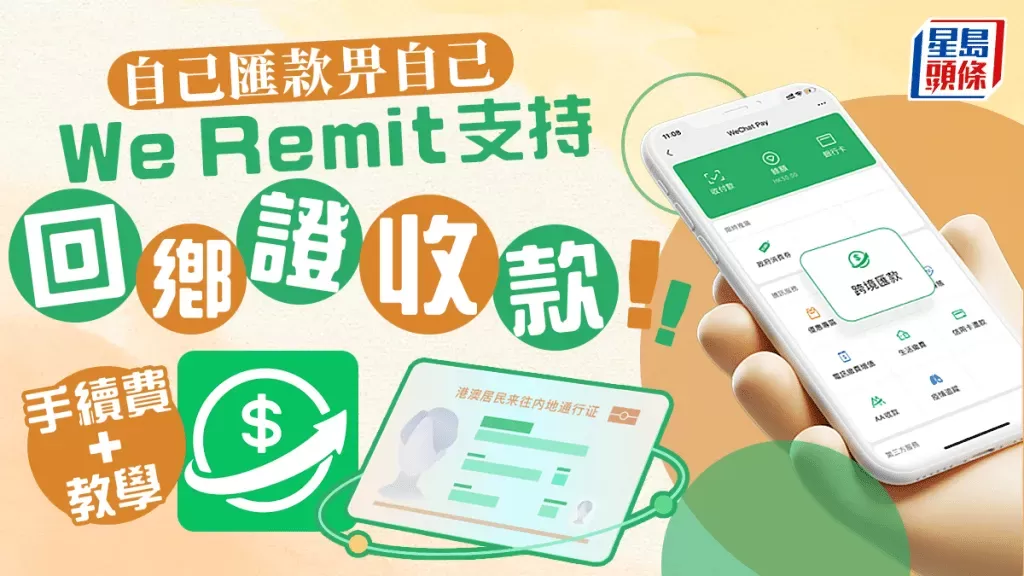
New opportunities for Hong Kong family offices! Policy Address 2024 reveals new directions!
2024-11-21
Japanese houses can last 200 years? It's true!
2024-12-05Against the backdrop of a globalized economy, capital flows between Hong Kong and the Mainland have become more frequent.
Both individuals and businesses need to know and understand the legal ways to move money between the two places.
In this article, we will introduce in detail the main methods of transferring personal funds from the Mainland to Hong Kong and from Hong Kong to the Mainland, which will help you to complete cross-border fund transfers safely and quickly.

01
Mainland to Hong KongCross-border bank remittances
Cross-border remittance through banks is a common method of transferring funds from the Mainland to Hong Kong. However, it needs to be categorized into two situations: Mainland status and Hong Kong status. Mainland status
Mainland residents cannot remit RMB directly to Hong Kong (except for some special products, e.g. Cross-border Wealth Management), and can remit RMB after converting it into foreign currencies.
According to the State Administration of Foreign Exchange (SAFE), the total amount of foreign currencies that can be remitted by Mainland residents cannot exceed the annual total amount of US$50,000 for individual settlement and sale of foreign currencies. Hong Kong Identity
Hong Kong residents can repatriate any undrawn balance of RMB previously remitted from Hong Kong, and the payee and remitter must be the same person.
If it is the current account legitimate RMB income obtained by a Hong Kong resident within the territory, he/she needs to use his/her own valid ID card and information on the source of funds for the purchase of foreign exchange with the amount of the transaction, and remit the money after purchasing foreign exchange at the bank.
In the case of outward remittance of foreign exchange from a Hong Kong resident's foreign exchange account, the remittance can be made on the basis of his/her valid identity card.
In case of remittance of foreign currency banknotes with an aggregate equivalent value of less than 10,000 US dollars (including 10,000 US dollars) on the same day, it can be handled by presenting one's own valid ID document.
However, if the remittance exceeds the above amount, the remittance should be handled with a valid identification document, a Customs Declaration signed by Customs, or a foreign currency cash withdrawal slip from the original deposit bank.

Carrying cash in Hong Kong
The Immigration Department has strict regulations on the carrying of cash, with a limit of 20,000 RMB and 5,000 USD per person per trip.
In special cases, such as multiple round trips on the same day or multiple round trips within 15 days, there is a limit on the amount of foreign currency that can be carried, and the relevant regulations must be followed.

If the above amount is exceeded, it is necessary to apply for a Permit for Carrying Foreign Exchange out of Hong Kong from a designated bank. Citizens are required to make a declaration to the Customs officers if they are carrying currencies with a total value higher than 120,000 Hong Kong Dollars or other forms of cash-type goods, and the declaration must be made by providing the appropriate documents: visas, laissez-passer, bank deposits certificates, and so on.
If you choose this method, you need to know and follow the rules for carrying cash in advance to avoid unnecessary hassles and risks.ATM cash withdrawal
According to the regulations of the Foreign Exchange Administration, each person is limited to withdrawing RMB 10,000 per day overseas, and the cumulative amount of cash withdrawn per year shall not exceed the equivalent of RMB 100,000 per year.
When withdrawing cash from ATMs in Hong Kong, the handling fee is higher, usually between $15-$50 per transaction, and the withdrawal amount is limited to about HK$4,000 (depending on the bank's rules).
This method is therefore suitable for small, urgent financial needs.
However, the realization of the domestic cash withdrawal function of foreign cards depends mainly on the degree of business coverage of the card organization to which the bank card belongs, as well as the compatibility of cash withdrawal machines.

electronic payment
There is another way to spend money directly in Hong Kong by binding your mainland bank card to WeChat/Alipay. The system will automatically convert according to the real-time exchange rate and deduct the corresponding Hong Kong dollar amount, which is convenient and fast.
However, you need to know in advance whether your mainland bank card has been enabled for overseas transactions, otherwise the payment is likely to be unsuccessful.
Alipay transfer
You can transfer the required funds to your Alipay account and then transfer them to your local savings card in Hong Kong via international remittance, for which Alipay will charge a handling fee of RMB 50.
In addition, Alipay international remittance can accumulate up to US$50,000 per person per year, and the relevant handling fee depends on the overseas bank.

In that case, how should the capital of Hong Kong be turned over to the Mainland?
02
Hong Kong to MainlandCross-border remittances
Like the abovementioned "Mainland funds to Hong Kong" method, Hong Kong funds can also be transferred to the Mainland by means of cross-border remittance. Mainland Identity
Open a bank account in Hong Kong and deposit funds into it. These banks usually provide convenient cross-border transfer services, and people can make use of the foreign exchange quota of up to US$50,000 per person per year to remit funds from their Hong Kong accounts directly to their mainland bank accounts. Hong Kong Identity
Hong Kong residents who wish to remit RMB to a recipient of the same name in the Mainland are not allowed to remit more than RMB 80,000 per day.
There is normally no restriction on Hong Kong residents who wish to remit foreign currencies to their Mainland accounts, but they are required to make relevant declarations.

exchange store
There are many money changers in Hong Kong and each of them offers money transfer services with fast time, higher transfer limits than banks and low handling fees. These advantages make them the first choice of many businessmen for large remittances.

The handling fee for remittance to the Mainland from exchange stores is about HK$20 to HK$30 per remittance, with less restriction on the remittance amount, which can usually be settled on the same day.
However, it should be noted that there have been frequent cases of fraudulent exchange stores in recent years, and Hong Kong people should look for large and reputable stores when choosing an exchange store.
In the course of transactions, Hong Kong people should see clearly whether the receipts comply with the Currency Exchangers Ordinance, including the name of the store in both Chinese and English, the date of the transaction, the exchange rate, and the amount and type of currency in which both parties have transacted. At the same time, they should read carefully the disclaimer on the receipt to ensure that they can safeguard their rights and interests in the event of problems with the transaction.
Online remittance
With the continuous development of network technology, e-payment has become an increasingly popular method of cross-border remittance. both Wechat Pay HK and Alipay HK offer cross-border remittance services, providing Hong Kong people with a more convenient and efficient remittance channel.

Currently, the maximum remittance amount for Wechat Pay HK Junior Certified users is HK$7,999 in a single day, and the maximum remittance amount for a single transaction is also HK$7,999, with a monthly cap of HK$50,000; the maximum remittance amount for Senior Certified users is HK$20,000 in a single transaction, and the same for a single day, with a monthly cap of HK$100,000.
Alipay HK also supports remittance to the Mainland version of Alipay. Hong Kong people need to first authenticate their own or friends' Mainland Alipay accounts using their Hong Kong and Macau Residents Entry and Exit Permit (Home Visit Permit) with their real names. After authentication, Hong Kong users can remit money directly to their mainland Alipay accounts.
Currently, Alipay HK charges a handling fee of HK$25 per remittance, but the handling fee is waived for each remittance over RMB 3,000. Identity verification is required to use Alipay for remittance. After completing identity verification, remittance to the Mainland is limited to HK$20,000 per day, HK$100,000 per month, HK$500,000 per year, and there is no limit on the number of times remittance can be made.

electronic payment
There is another way to spend money directly by binding your Hong Kong bank card to WeChat/Alipay. The system will automatically convert according to the real-time exchange rate and deduct the corresponding Hong Kong dollar amount, which is convenient and fast.
ATM cash withdrawal
Cash withdrawals from ATMs of mainland banks using Hong Kong bank cards do not take up foreign exchange quota, but they are usually subject to limits and handling charges.
However, it should be noted that the realization of the function of cash withdrawal within the territory of foreign cards mainly depends on the degree of business coverage of the card organization to which the bank card belongs, as well as the compatibility of cash withdrawal machines. If you want to withdraw cash through ATMs, you need to know the above in advance and whether cross-border cash withdrawal can be supported.POS machine swipe card
At the same time, it is also possible to directly use the POS machine of China UnionPay in the Mainland to swipe the Hong Kong bank card for spending. This method is suitable for small and frequent financial needs such as buying a house or a car, getting sick and going to the doctor, and daily shopping.

Although there are various ways for the flow of funds between Hong Kong and the Mainland, each of them has its own characteristics and limitations. When choosing a specific way, comprehensive consideration should be given to factors such as individual needs, size of funds and cost of fees to ensure that the flow of funds is legal, safe and efficient.
If you would like more information, please feel free to inquire!


